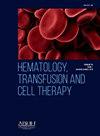Outcomes of upfront plerixafor use for mobilization in germ cell tumor patients
IF 1.8
Q3 HEMATOLOGY
引用次数: 0
Abstract
High-dose chemotherapy with autologous hematopoietic stem cell transplantation (auto-HSCT) improved 5-year overall survival rates in relapsed/refractory germ cell tumors (GCTs) from 10% to 52%. Nearly 30% of GCT patients are deemed poor mobilizers after receiving several lines of prior therapy. There is limited data available regarding upfront plerixafor use in GCT patients. We predicted upfront plerixafor use would increase the amount of stem cells collected preventing subsequent mobilizations and improve time to curative therapy. A retrospective, single center, chart review of adult GCT patients who received plerixafor upfront for mobilization at a single center between January 1, 2013 and August 31, 2021 was performed.
The primary objective was to evaluate the rate of successful peripheral blood CD34+ cell collections. Secondary objectives consisted of describing the impact of plerixafor use on mobilization and assessing auto-HSCT related outcomes. Sixteen patients received plerixafor upfront after an average of three prior lines of therapy (range: 2-5 lines). Successful collection (≥4 × 106 CD34+ cells/Kg collected within four days) was achieved in 15 (94%) patients in a median of one apheresis day (interquartile range: 1-2 days). All patients proceeded to an initial auto-HSCT and 12 patients (75%) completed both transplants as planned. Survival at 12 months was 50%.
The significantly higher amount of CD34+ cells collected over less apheresis days demonstrated the clinical utility of upfront plerixafor and its potential to facilitate more efficient stem cell mobilization. There is a need for larger randomized studies with upfront plerixafor use in this unique patient population.
生殖细胞肿瘤患者前期使用普乐沙福进行动员的效果。
大剂量化疗与自体造血干细胞移植(auto-HSCT)可将复发/难治性生殖细胞瘤(GCT)的5年总生存率从10%提高到52%。近30%的生殖细胞瘤患者在接受多线先前治疗后,被认为动员能力差。目前有关在GCT患者中先期使用plerixafor的数据非常有限。我们预测,前期使用普利沙福可增加干细胞收集量,防止后续动员,并缩短治愈治疗时间。我们对2013年1月1日至2021年8月31日期间在单个中心接受plerixafor前期动员治疗的成人GCT患者进行了回顾性单中心病历审查。首要目标是评估外周血 CD34+ 细胞的成功采集率。次要目标包括描述使用plerixafor对动员的影响以及评估自体HSCT相关结果。16名患者在接受了平均3个疗程(2-5个疗程)的治疗后先期接受了plerixafor治疗。15名患者(94%)在中位数一天(四分位间范围:1-2天)内成功采集(四天内采集的CD34+细胞≥4 × 106/Kg)。所有患者都进行了初次自体血细胞移植,12 名患者(75%)按计划完成了两次移植。12 个月的存活率为 50%。在较少的无细胞抽吸天数内,收集到的CD34+细胞数量明显增加,这证明了前期plerixafor的临床实用性及其促进更有效干细胞动员的潜力。对于这种特殊的患者群体,有必要进行更大规模的前期plerixafor随机研究。
本文章由计算机程序翻译,如有差异,请以英文原文为准。
求助全文
约1分钟内获得全文
求助全文
来源期刊

Hematology, Transfusion and Cell Therapy
Multiple-
CiteScore
2.40
自引率
4.80%
发文量
1419
审稿时长
30 weeks
 求助内容:
求助内容: 应助结果提醒方式:
应助结果提醒方式:


